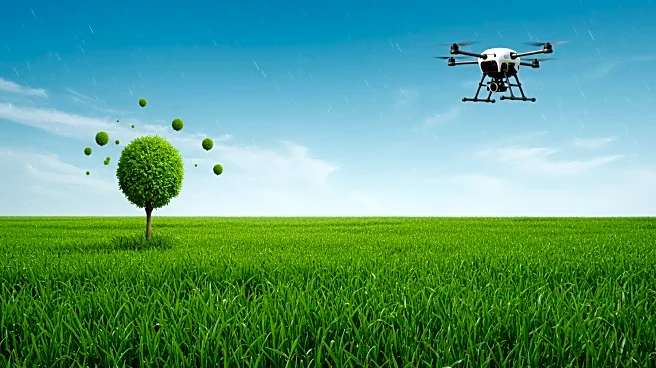What's Happening?
In 2025, Niger's agriculture sector faces significant challenges due to climate change, population growth, and resource scarcity. Over 80% of the rural workforce relies on agriculture, making it a critical economic sector. The country is experiencing erratic rainfall, extended droughts, and increased temperatures, which threaten food production and rural livelihoods. To address these issues, innovative solutions such as climate-smart practices, digital tools, and strategic resource management are being implemented. These include introducing drought-tolerant and pest-resistant crop varieties, conservation agriculture techniques, and integrated water management strategies. Additionally, digital transformation through platforms like Farmonaut is providing real-time monitoring and AI-powered advisories to enhance farm decision-making and outcomes.
Why It's Important?
The agricultural challenges in Niger have broader implications for food security and economic stability in the region. As climate change continues to impact traditional farming methods, adopting sustainable practices is crucial for maintaining crop yields and supporting rural livelihoods. The introduction of climate-smart agriculture and digital tools can significantly boost productivity and resilience, potentially increasing crop yields by up to 30%. This transformation is vital for ensuring food security and economic opportunities for Niger's growing population. Moreover, the use of satellite technology and AI can help farmers make informed decisions, reducing post-harvest losses and improving market access.
What's Next?
Looking ahead, Niger's agriculture sector is expected to continue integrating digital and satellite remote sensing technologies to enhance farm management precision. Efforts to empower rural youth and women in agriculture will be critical for driving innovation and entrepreneurship. Additionally, expanding export-led value chains and adopting carbon sequestration technology will further strengthen the sector's resilience to climate risks. As international partners and development banks invest in infrastructure and rural cooperatives, Niger is poised to become a model for sustainable agriculture in the Sahel region.
Beyond the Headlines
The shift towards sustainable agriculture in Niger also presents ethical and cultural dimensions. Embracing indigenous knowledge alongside modern science can optimize ecosystem services and enhance natural pest control. Furthermore, the integration of blockchain technology for traceability can strengthen Niger's role in regional value chains, promoting transparency and trust in agricultural markets. These developments highlight the potential for long-term shifts in agricultural practices and rural empowerment, contributing to national growth and resilience.











